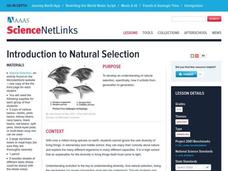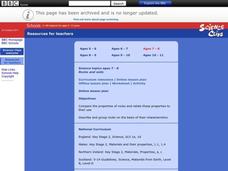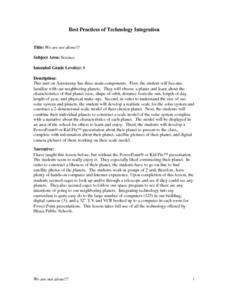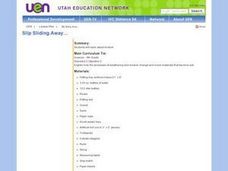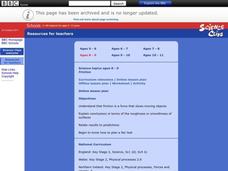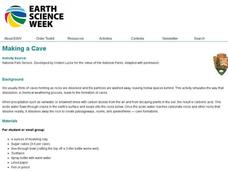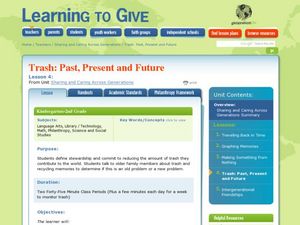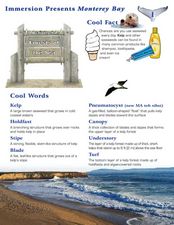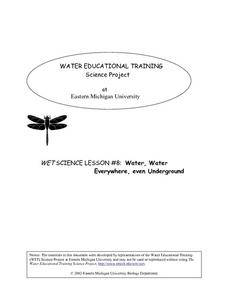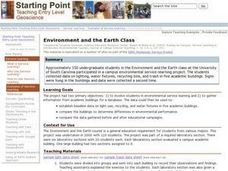Curated OER
Introduction to Natural Selection
Students develop an understanding of natural selection, specifically, how it unfolds from generation to generation. They work in small groups to perform an experiment using beans. They use a worksheet imbedded in this plan to guide their...
Curated OER
Rocks and Soils
Students compare the properties of rocks and relate these properties to their use. They perform a virtual experiment to describe and group rocks on the basis of their characteristics.
Curated OER
How to Make a Rock
Second graders watch demonstrations and conduct experiments that show the three different types of rocks: igneous, sedimentary, and metamorphic.
Curated OER
We Are Not Alone!!!
Eighth graders explore the area of astronomy. They explore Earth's neighboring planets. Students research a planet's characteristics. They develop a scale model of the solar system and a narrative about the planets.
Curated OER
Erosion: Slip Sliding Away
Fourth graders investigate the causes of erosion. Through several demonstrations including one using sugar cubes and warm water, they observe the effects of erosion. In groups, 4th graders conduct similar experiments and record their...
Curated OER
Funky Fungus
Students discuss decomposition, bacteria, fungi and other microscopic organisms. They participate in an experiment to grow fungus on bread. As the fungus colonies grow, students observe them under a microscope to identify and locate...
Curated OER
Reversible and irreversible changes
Students experiment with solids and liquids to find which solids will dissolve in water. This dissolution and mixtures lesson can be completed online or in class as all materials are connected to the lesson plan for both settings.
Curated OER
Friction
Students compare and contrast the movement of objects on different surfaces, experimenting with friction and forces of motion. This friction lesson has numerous online tools including worksheets and virtual activities; the option is also...
Curated OER
What is An Electromagnet?
Students explore and define electromagnets. In this electromagnet lesson, students access an assigned web site to research what an electromagnet is and how it works. They complete a database with information from the web site and...
Curated OER
Making a Cave
Young scholars discuss caves. In this science lesson, students experiment with how dissolution, a chemical weathering process, leads to the formation of caves. Once the cave is finsihed young scholars draw a picture or describe in...
Curated OER
Rain On
Fourth graders explore evaporation and condensation. In this water cycle lesson, 4th graders investigate their surroundings for real-life examples of evaporation and condensation. Students conduct various experiments.
Curated OER
Getting A Charge Out of the Sky
Students investigate electricity from the sky. In this electricity lesson, students participate in an experiment to simulate the electric charges from the sky. Students discuss results.
Curated OER
Trash: Past, Present and Future
Students explore how much trash they create. In this recycling lesson plan, students define stewardship and conduct an experiment to see how much trash the class produces in a week. At the end of the week the students propose ways to...
Curated OER
Using Repeat Photography to Map Environmental Hazards
Learners investigate the changes of their environment by experimenting with photography. In this environmental observation lesson, students compare historic photographs of areas with pictures they have just taken. Learners...
Curated OER
Forests of the Sea
Students read about and conduct experiments to learn about the vegetation under Monterey Bay. In this Monterey Bay lesson, students read about and look at brightly colored pictures of the different types of seaweed that grows in the bay....
Curated OER
Water Magic
Learners conduct experiments with ice, water and steam to observe the water cycle. They discuss substances that water accumulates from the Earth as it moves through its cycle.
Curated OER
Phases of the Moon
Students read "The Moon Seems to Change" and conduct an experiment with oranges to demonstrate the phases of the moon. They write about the experiment and describe each phase of the moon.
Curated OER
Water, Water Everywhere, Even Underground
The "Engage" section of a wetlands lesson plan asks young ecologists to examine a wetlands poster. You can easily find one online and display it using a projector. Pupils immerse a piece of sandstone and a piece of granite in water to...
Curated OER
Beyond the Earth Part II
Students explore the solar system. In this solar system lesson plan, students use Internet and print resources to research a component of the solar system. Students create travel brochures based on their research findings.
Curated OER
Structure of Earth
Seventh graders study and make a model of the significant formations of the ocean floor. They examine images and illustration and apply their imagination while creating the model. They are challenged to complete further research as an...
Curated OER
Earth's Ecosystem: Seven Major Biomes
Students discuss the different types of ecosystems and the composition of biomes. Working in groups, they define various related terms and make posters of them. Then they explain their posters to the class.
Curated OER
Environment and the Earth
Students were involved in environmental service learning and they gathered information from academic buildings for a database. The data allowed them to use an establish baseline data on light use, recycling, and water fixtures in five...
Curated OER
Ecological Impact of Wood Extraction
Students explore their local environment by conducting a class experiment. In this deforestation lesson, students discuss the effects of wood harvesting on forests around the world and research environment related vocabulary terms....
University of Wisconsin
A Rain Garden Year
Pupils become plants in an interpretive play that depicts what happens throughout the seasons in a rain garden. As you narrate, young scholars bloom, flower, and go to seed accordingly. The instructional activity is first in a series of...
